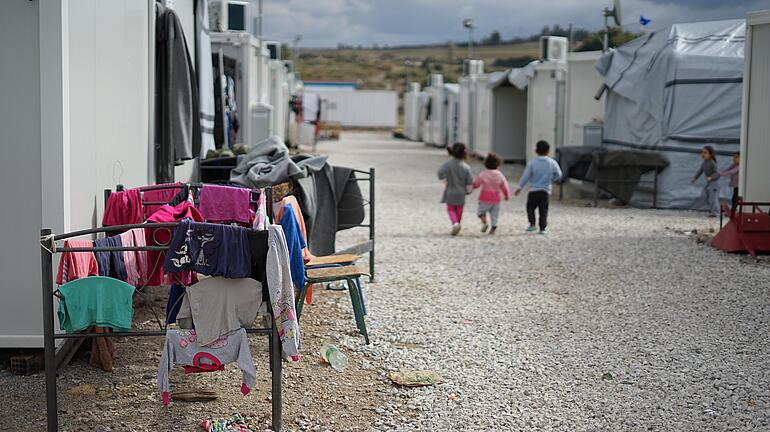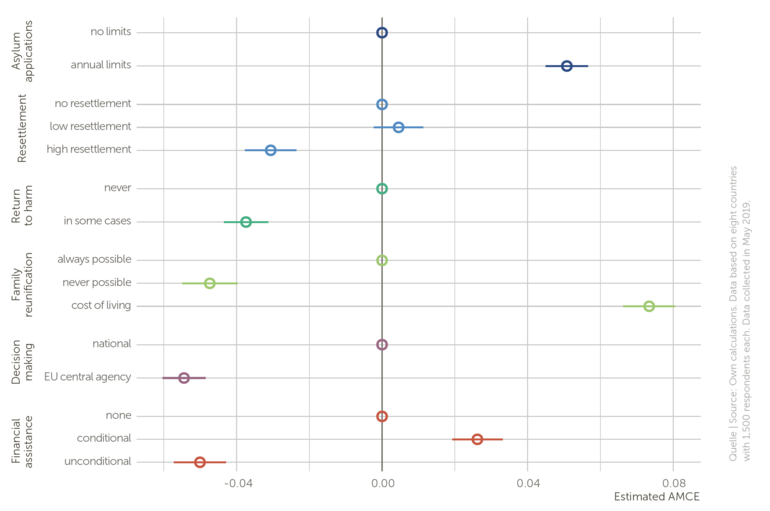Kiel Institute Highlights
EU Citizens basically agree on Asylum and Refugee Policy
Few issues spark such intense discussion within the European Union (EU) as asylum and refugee policy. The national policies of the individual member states are justified by citing different preferences within the population, thus apparently underpinning the negotiating positions that have, over the past years, made any reforms aimed at finding an effective common European solution impossible. However, if one asks people directly, as we did in our recent study, there is much more agreement across countries, which could provide a way forward for policy makers.

Voters’ opinions are widely considered to be highly important, yet Europeans’ preferences around asylum and refugee policy have previously hardly been studied empirically. That stands in stark contrast to an extensive emerging literature that assesses attitudes towards immigrants and asylum seekers. The few existing studies focus on very limited aspects of asylum and refugee policies and define these on a bipolar scale (i.e., between the extremes of “support” and “oppose”).
Our new paper (Jeannet et al., 2021) is the first to systematically study public preferences toward policy in a multidimensional and non-binary way, thus allowing for variation in both the restrictiveness of the policy and the limits and conditions of the protection provided to asylum seekers and refugees. We used an experimental design (“conjoint experiment”) that is also widely deployed in fields such as market research, where firms want to understand consumers’ preferences for products that vary in several dimensions.
Survey of representative groups in eight countries
In the experiment, respondents were asked to choose between two policy packages that consisted of six dimensions designed to reflect the essential concepts underlying asylum and refugee policies. These are: upper limits on asylum claims; resettlement; non-refoulement, i.e., whether people can be returned to potential harm such as torture; family reunification; centralization of EU decision-making; and financial solidarity between member states. Nationally representative online panels of 1,500 respondents in eight EU countries (Austria, France, Germany, Hungary, Italy, Poland, Spain, and Sweden) participated in the experiment. The countries chosen differ with regard to their experience of refugees and their labor markets, welfare systems, and cultural institutions.
Protection under controlled conditions preferred
The main results can be seen in the figure. Within a policy dimension, policies that are to the right of the vertical line make policy packages more likely to be chosen by voters. Policies on the left of the dividing line reduce the likelihood that a voter would choose a corresponding policy package. It turns out that Europeans are generally committed to policies that provide protection to asylum seekers and refugees and that there is no widespread support for eliminating protection and assistance altogether.
However, this commitment to providing protection depends on policy features that impose some limits or conditions, which allow control. In a second study (Jeannet et al., 2020), we showed that the preference for such limits and conditions is strongly linked to trust in EU institutions. People who do not trust the EU tend to prefer policies with more substantial restrictions and conditions, whereas those who trust the institution prefer less conditional policies. We argue that policies that limit support or impose conditions provide a substitute for effective migration management for those who do not trust policy makers’ ability to ensure the latter.
Effects of policy features on the probability of accepting an asylum and refugee policy

The figure displays average marginal component effects (AMCEs) to indicate the effects of policy features on the probability of accepting an asylum and refugee policy relative to the dimension’s reference category. For example, policies that return refused asylum seekers to situations where they could face harm reduce public support for the asylum and refugee policy when compared to policies which never return refused asylum-seekers to such situations (AMCE=-0.037 meaning that public support for the asylum and refugee policy is reduced by about 4 percentage points). Similarly, policies that do not provide any opportunities for family reunification for recognized refugees reduce public support when compared to policies that always allow family reunification (AMCE=-0.047).
Citizens of Europe are basically in agreement
Overall, the pattern of preferences (i.e., preferring protection in conjunction with limits and conditions) is remarkably similar across European countries, applying in both old and more recent EU member states. Even in Hungary, which has a particularly strong anti-refugee government position, the public do not want a complete end to protecting asylum seekers and refugees. This finding of cross-country similarities in asylum and refugee policy preferences stands in contrast to the popular wisdom, which suggests that Europeans are divided on these issues and their governments thus have no way of making reforms that will receive public support across the different countries.
On the contrary, our results suggest that there is a basis for policy reforms that would receive widespread public support across Europe. These measures would provide protection and support, although policies that place greater emphasis on limits and conditions may well need to be considered.
Our studies do not imply that policies should be solely based on voters’ preferences. Human rights, international treaty obligations, and the like are fundamental criteria that policies must meet. This is particularly relevant for policies such as refugee protection, which provide global public goods and, therefore, are grounded in international law (e.g., the Geneva Convention). Conversely, serious political conflict could arise if policies are substantially misaligned with voter preferences. This might make national governments feel pressured to reduce their active involvement in providing these global public goods.
Related Publications
References:
Jeannet, A.-M., T. Heidland und Martin Ruhs (2021). What Asylum and Refugee Policies do Europeans Want? Evidence From a Cross-National Conjoint Experiment. European Union Politics, 22 (3): 353–376.
Jeannet, A.-M., T. Heidland und Martin Ruhs (2020). A Need for Control? Political Trust and Public Preferences for Asylum and Refugee Policy. Robert Schuman Centre for Advanced Studies Research Paper 2020-01.